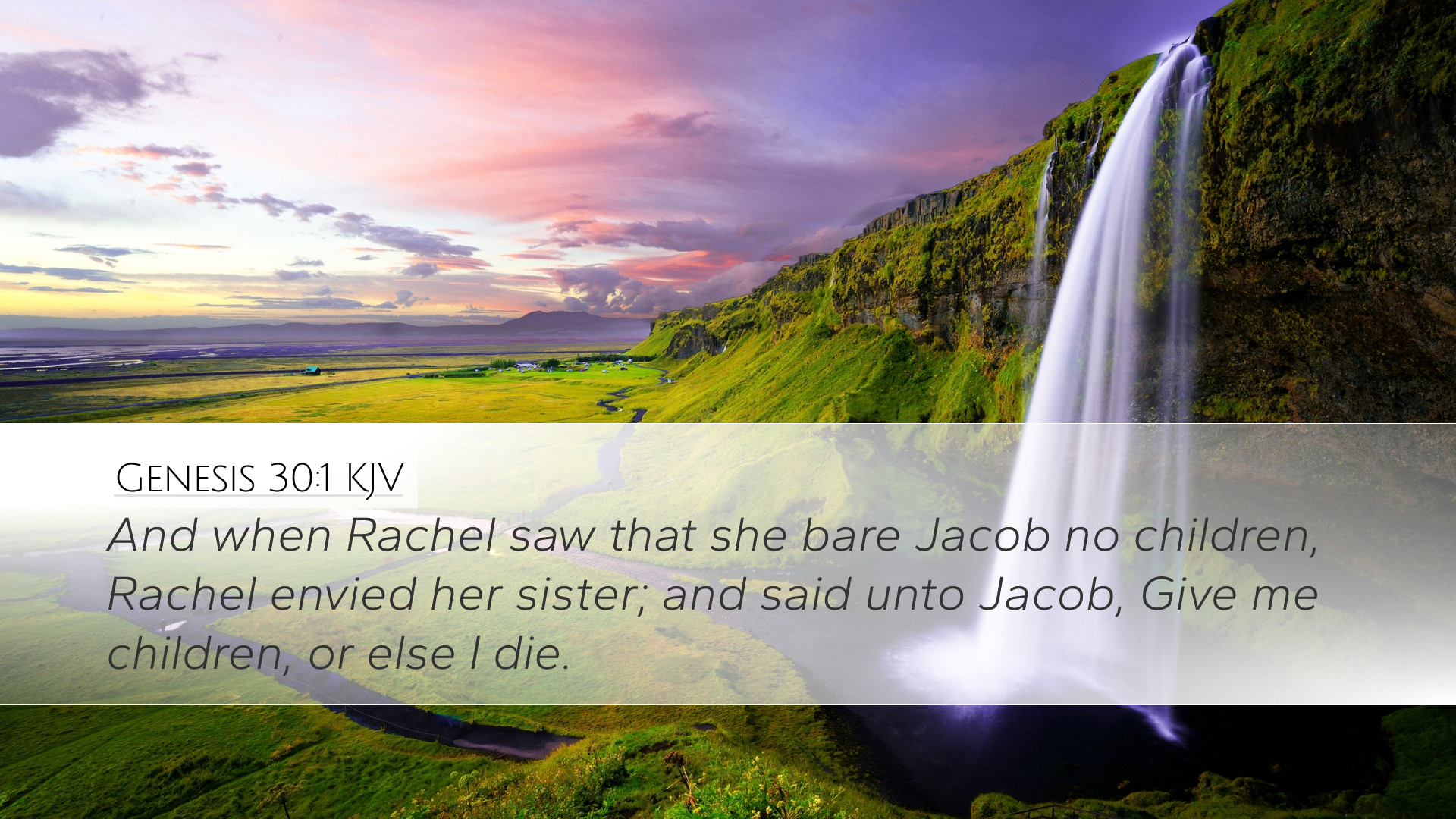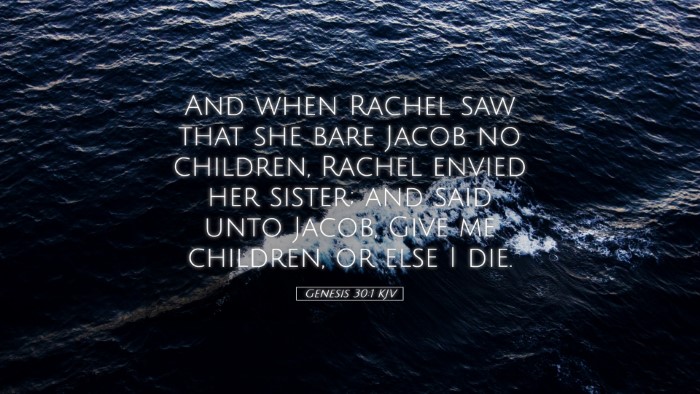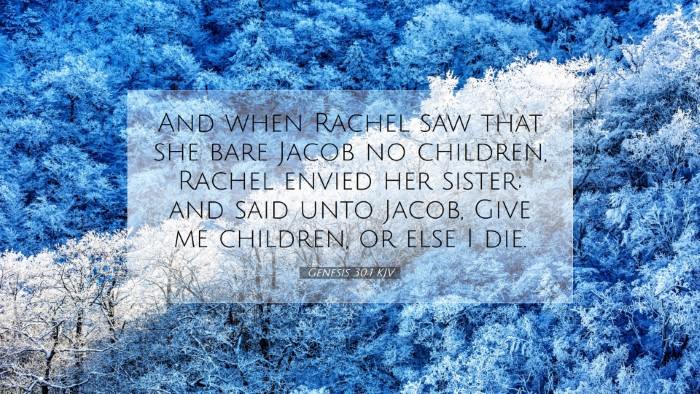Genesis 30:1 (KJV): "And when Rachel saw that she bare Jacob no children, Rachel envied her sister; and said unto Jacob, Give me children, or else I die."
Introduction
The complex emotional landscape of Genesis 30:1 serves as a poignant reflection on the desires, frustrations, and relational dynamics that underpin human experience. Rachel's desperation for children not only showcases her envy toward Leah but also reveals deep-seated cultural values surrounding motherhood and familial lineage. In examining this verse through the lenses of commentary, we can glean insights that are both historical and applicable to contemporary life in ministry and scholarship.
Contextual Background
In the previous chapters, we witness Jacob's tumultuous relationships with his wives, Rachel and Leah, daughters of Laban. The conception and bearing of children is of immense significance in the patriarchal society depicted in Genesis. Children were seen as a sign of favor from God, as well as a crucial means of securing family lineage and heritage. The cultural backdrop of this narrative amplifies Rachel’s distress over her barrenness.
Commentary Insights
Matthew Henry's Commentary
Desire and Envy: Matthew Henry emphasizes that Rachel's envy stems from her deep desire for children, which, in the context of her situation, translates into a fight against the perceived injustice of her circumstances. Henry notes that envy is a destructive emotion, indicating a discontentment not only with one’s situation but also a resentment against others who are favored.
Impulsiveness in Human Nature: He also comments on the impulsive nature of Rachel’s demand to Jacob, demonstrating the human tendency to react emotionally rather than rationally. Her extreme request reflects a larger theme in the Scriptures about the dangers of desperation leading one to irrational decisions.
Albert Barnes' Commentary
Perspective on Fertility: Albert Barnes provides insight into the societal and familial implications of childbearing. He suggests that Rachel’s demand stems from both personal and social expectations. In ancient cultures, producing offspring was essential for sustaining one's family legacy. Rachel's plight thus underscores the weight of such expectations on women of her time.
Jacob's Role: Barnes also discusses Jacob’s position in this emotional turmoil. He is caught between the longing of Rachel and the realities of his familial obligations. Jacob's frustration at Rachel's request reveals the complexities of polygamous relationships and their inherent challenges. Barnes reflects on the need for understanding, patience, and compassionate communication in fulfilling marital roles.
Adam Clarke's Commentary
Theological Implications of Barrenness: Adam Clarke delves deeper into the theological dimensions of Rachel’s barrenness. He points out that her inability to conceive can be seen in light of God’s sovereignty. Clarke suggests that barrenness may sometimes serve divine purposes, highlighting a spiritual journey that encourages reliance on God.
Rachel's Cry for Help: Clarke also underscores the seriousness of Rachel’s emotional crisis - "Give me children, or else I die" is not merely a plea; it conveys a sense of existential despair. This verse taps into a deep longing for fulfillment that many experience when faced with the challenges of life.
Theological Reflections
This verse opens a window into several theological themes that resonate throughout Scripture:
- Human Emotion and Divine Sovereignty: Rachel’s fervent desire juxtaposed with her barrenness raises questions about the nature of suffering and divine timing.
- The Complexities of Relationships: Rachel and Leah’s rivalry showcases the complexities of familial relationships and the impact of sibling rivalry that can arise from societal pressures.
- Desire for Legacy: The desire for children is symbolic of a broader human desire for legacy and significance in the grand narrative of life.
- God's Faithfulness: Ultimately, this story foreshadows God's eventual faithfulness, as seen in the lives of Rachel and Leah and their children who become the heads of tribes in Israel.
Practical Applications for Ministry
For pastors, students, and theologians, Genesis 30:1 offers several practical applications:
- Empathy in Counseling: Understanding the depths of human emotion can equip counselors and pastors to respond with compassion and wisdom when dealing with issues of infertility and relational strife.
- Community Support Systems: This passage challenges churches to foster supportive environments where individuals feel valued beyond their ability to contribute (or reproduce) in conventional ways.
- Discerning Divine Will: The narrative encourages believers to discern God’s will in times of hardship, trusting in His sovereignty and timing.
- Teaching on Envy and Contentment: It presents an opportunity to teach about the perils of envy and the importance of finding contentment in one’s circumstances.
Conclusion
Genesis 30:1 is a powerful verse that encapsulates the struggles of human emotions against the backdrop of divine providence. As highlighted by the commentaries of Matthew Henry, Albert Barnes, and Adam Clarke, the themes of desire, emotional struggle, cultural expectations, and God’s sovereignty are deeply interwoven in this text. Understanding these elements can enhance both theological instructing and pastoral care, leading to a robust application of scriptural truths in the lives of our communities.


